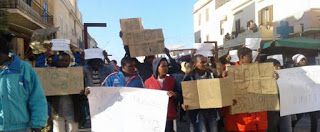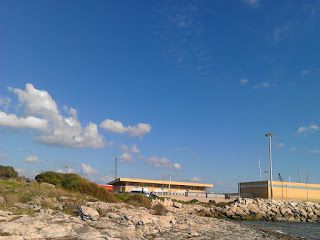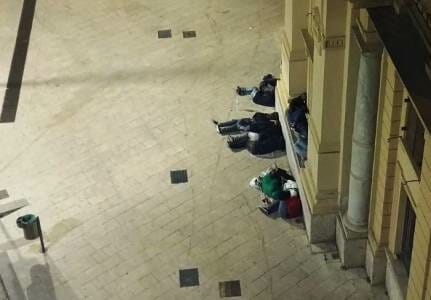Palermo, Playing with the Futures of Unaccompanied Minors
Yet another missed call, and again it is from Ben [NB: all names have been changed], a 16 year old who insists that he has to talk to me as soon as possible. I decide to meet up with him, even if I won’t have any way as well of listening to the managing body of the centre in which he is housed, given that in many of the various kinds of centres for minors it is complicated enough to set up a meeting.
We meet Ben at the beautiful marina of Porticello (province of Palermo), under a baking sun and opposite a calm sea. With some surprise we find that the teenager is with another seven friends who,
with a little shyness, we greet with handshakes and smiles.
Ahmed, a 17-year-old Senegalese man, tells us about being in Italy for six months, of not having a scrap of documents, and of not understanding what he is waiting for in order to begin his administrative pathway. He tells us how he needs documents, like everyone, because he wants to retrieve the hope he lost after four months in Libya, where he was beaten many times along with his friends, and where he spent three months sleeping with his shoes on, ready to run away from the torture squad who rounded people up every night in the hub near the beach where the migrants slept while waiting to leave for Europe. Ahmed remembers that they managed to eat only once a day, and of having seen countless young men and women lost along the road. “In the evening they would count us to see who have been taken and if there were new arrivals. Many returned the next day, but a great many I never saw again. I couldn’t stay in Libya, in that nightmare.” Ahmed is very small, and although he was declared to be 17 when he arrived at Palermo, he does not look it. He still has not been given the chance to change his date of birth, because the workers in the reception centre in which he is staying simply tell him “after, after. But after when?”, he continues.
The managing body of the community for minors in which Ahmed and Ben are staying is the “Azzura nuova” social cooperative, which has taken on the role of a primary reception centre for minors since last year, after years of experience with people with disabilities.
The cooperative was allowed to open its doors on 28 December 2015 to a large amount of young men, both in Porticello and in Petralia, without any accreditation from the Ministry of the Interior, thanks to the fact that on that fateful day the Palermo city council had no structures available to host the many minors arriving in the province. Via a questionable process, the cooperative was entrusted with 80 minors, who have been housed in the two complexes. As much as there are problems within the two emergency centres, these are principally to be attributed to lack of experience and the absence of specialists, as well as to an incompetency in managing the buildings’ logistics. This is the situation which immediately unfolded at Petralia, where the residents have held various protests, and in the end ran away. Notwithstanding that 11 of the 25 residents remained, the centre was closed, an action which also resulted from the absence of the resident’s stipends which, as some ex-workers have said, were in the end being paid out of their own pockets.
The survivors of this misadventure were then transferred to the cooperative’s second centre in Porticello. The moral of the story: the institutions have closed a centre due to irregularities, and have entrusted the 11 minors to the very same cooperative! Obviously the Palermo city council is responsible for this patently absurd situation which, while prepared for a respectful welcoming for new arrivals at the port, forgets those same people in the successive phases. But with minors (as has been denounced many times) the situation is more critical still, given that the places in the province have been exhausted and the only solution which has been used systematically is to ask Caritas to take on the weight of the emergency. Furthermore, once Caritas, the cooperatives and other bodies have made themselves available, they are then abandoned by the council, who have not delivered their subsidies to the centres for minors for more than nine months.
Yesterday the workers from the centres in the province of Palermo protested in front of the council offices, demanding that the funds be transferred regularly from the Ministry of the Interior. The centres asked for the payments to be monthly at the least, or else they will close the doors and leave 800 minors on the street.
Due to this situation, the Azzurra cooperative has very likely failed to provide due care, as the young men who we met told us, starting with the clothing situation, through to problems with hot water and drinking water, and ending with the often inedible food and the Italian lessons which comprise of only 4 hours a week. But that which annoys the young men the most, and which they cannot understand, is why they have never received legal information regarding their own situations, nor have they ever met their legal guardians.
This lack of response and attention generates short circuits which, in the end, the minors suffer. Beyond the complaints and accusations made by the residents, which we will verify with the cooperative, the fact remains of the inescapable reality of a horrendous failure in communication or, worse still, horrendous management.
Denis said goodbye to us a little before the others, asking us “don’t abandon us, do something, the situation here is terrible, we don’t sleep with our shoes on but for the rest we can’t see any hope here.”
We will try to meet the young men’s expectations. In the meantime, we have informed Save the Children, the Santa Flavia town council and the Prefecture of Palermo of the situation, so that they can make the necessary checks, because one doesn’t play with the future of minors!
Alberto Biondo
Borderline Sicilia
Project “OpenEurope” – Oxfam Italia, Diaconia Valdese, Borderline Sicilia Onlus
Translated by Richard Braude



